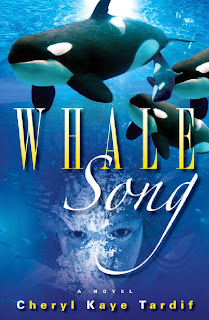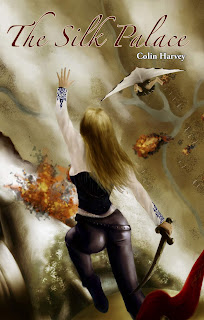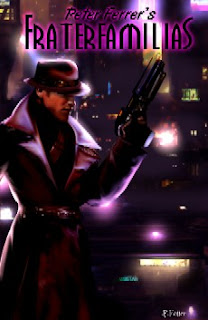
The Last Free Men - by Jack Everett & David Coles.
Why you chose that particular setting?
Hadrian's Wall was built to divide Scotland from England in the 2nd Century CE. We spent a long spring time week-end trekking along the Wall and exploring the remains of the Roman fortresses.
One evening, just as the sun was touching the hills beyond the little river of Poltross Burn, we found a place where Hadrian's Wall used to cross the water. The crossing is called Willowford and of course, the ancient bridgeworks have long since tumbled into the water.
At that time of the day, though, it was possible to look back into history, we could see the Roman legionaries trudging along the Wall, we could hear the native tribesmen planning their raid.
We already knew about the layers of ash that signified fires in the nearby mile castles and the turrets. As the sun was setting, it was easy to see the tribesman slide into the cold water and let themselves drift through the sluiceways, to seek cover, to... well, the story almost told itself.
There was one more thing that compelled this story. We came across this quote from the histories of Tacitus, it's from the pre-battle address to his warriors by Calgacus at Mons Graupius:-
“We, the last men on earth, the last of the free, have been shielded till today by the very remoteness and the seclusion for which we are famed... But today the boundary of Britain is exposed; beyond us lies no nation, nothing but waves and rocks and the Romans.”
What does the setting add to the story?
Mood! Where else are you going to find 2000 year old forts, a wall stretching over 80 miles, from one sea to another? Country so rugged that it's almost too hard to wring a living out of it?
This was under the heel of the Roman Army; arguably, the most successful military machine in history - think of the plight of the American Native tribes under the British and spread that across the known world of two centuries ago. Britain supplied wheat, silver, gold, lead, hunting dogs, slaves and conscripts - rich pickings.
And trouble. Boudicca almost routed the Roman Army and caused them to think twice about staying - these barbarians were dangerous. The Druids, according to the Occupiers, practiced religious rites that even the Romans called abominations. Hadrian built his Wall to keep out the savages beyond
Could you write the same story in a different setting?
It wouldn't then be the same story
Why or why couldn't you use a different setting?
We use a lot of real places, real people and events from history that don't appear together in other settings.
Did you use a real place as a basis for your setting?
Hadrian's Wall in general, Housesteads Fort in particular, are real places. You can go there and soak up the ambience, what went into the book can be seen in your mind's eye. Our first glimpse of the book happened at sunset where a small river runs through the remains of the Wall, it was all there.
Or, did you create the setting from scratch?
The later stages of the book take place in an off-the-map location, a place that is a fusion of several others. We needed something tailored to our requirements and then we buried it under a falling mountain.
Is there anything else about your setting that we need to know? Feel free to share.
Hadrian's Wall was conceived as a military installation, major forts are built every few miles, fortlets are built every mile, guard turrets every hundred yards. Before its final completion, it became a customs post, with gateways at convenient points, villages with hotels grew up near most of the forts. Trade went on, smuggling, the odd raid; occasionally, major forays into the barbaric lands north of the Wall were mounted - punitive, mostly.
The later setting, a large plain scoured out of a rocky valley by an ancient water flow was built especially for the story. Perhaps the ancient Gods of Britain had a hand in that; Marcus Uffin Gettorix, hero, was never really sure.
Tell us some specific details about your setting. What would we see? What sort of people are there? If we were travelling to your setting, what should we bring with us? For visitors, what do they need to know to visit your setting?
Britain in AD128 was a beautiful and a wild place. It was a place of wretchedness where Death was a casual visitor and Disease an ever-present one. It was a place of civilised living with more and more of the native chiefs buying into the Roman dream of comfortable villas and baths and mosaics and wine instead of ale.
Roman military might was everywhere, guards, marching columns, barracks, highways. Roman Gods had come with the occupiers so there were shrines and temples to Jupiter and Mithras and so on, but they were quite tolerant of the local hierarchy and there would be both British and Roman shrines to Coccidius and others, even to local geneii. Smells: the smell of horse dung, wood smoke, sweat, human faeces.
Native dress consisted of linen gowns for women, bleached, dyed and embroidered, while men wore checked woollen trousers, long shirts. Both sexes wore woollen cloaks and boots, both wore jewellery: torcs, armbands, brooches made from silver, bronze, sometimes gold. Much of the jewellery was very fine, traded from the continent as well as made at home. The men carried weapons, steel swords longer than the Roman weapons and often forged with beautiful patterns - the equivalent worth of a modern small car.
The Roman men were mostly military and would wear military gear; the less macho would wear woollen trousers in the harsh British winter. A certain proportion would be traders, clothed in similar fashion to the native Britons.
Travelling far usually meant horseback or horse and cart. Romans or Romanophiles would stay at hotels along the way. Such hotels were government run in a similar way to modern establishments. Money was in the form of coin, issued by major British chieftains or Roman, minted in Rome and sent in strongboxes to pay the army.
Thank you for sharing details about your book setting. Now, what's the title of your book and where can we buy it?
The Last Free Men - by Jack Everett & David Coles
Please provide your website link.
http://www.davidBColes.co.uk http://www.JackLEverett.me.uk
What is the link to buy your book?
http://www.virtualtales.com/StoryProducts~tn~Last+Free+Men.html
The Last Free Men - by Jack Everett & David Coles.
Why you chose that particular setting?
Hadrian's Wall was built to divide Scotland from England in the 2nd Century CE. We spent a long spring time week-end trekking along the Wall and exploring the remains of the Roman fortresses.
One evening, just as the sun was touching the hills beyond the little river of Poltross Burn, we found a place where Hadrian's Wall used to cross the water. The crossing is called Willowford and of course, the ancient bridgeworks have long since tumbled into the water.
At that time of the day, though, it was possible to look back into history, we could see the Roman legionaries trudging along the Wall, we could hear the native tribesmen planning their raid.
We already knew about the layers of ash that signified fires in the nearby mile castles and the turrets. As the sun was setting, it was easy to see the tribesman slide into the cold water and let themselves drift through the sluiceways, to seek cover, to... well, the story almost told itself.
There was one more thing that compelled this story. We came across this quote from the histories of Tacitus, it's from the pre-battle address to his warriors by Calgacus at Mons Graupius:-
“We, the last men on earth, the last of the free, have been shielded till today by the very remoteness and the seclusion for which we are famed... But today the boundary of Britain is exposed; beyond us lies no nation, nothing but waves and rocks and the Romans.”
What does the setting add to the story?
Mood! Where else are you going to find 2000 year old forts, a wall stretching over 80 miles, from one sea to another? Country so rugged that it's almost too hard to wring a living out of it?
This was under the heel of the Roman Army; arguably, the most successful military machine in history - think of the plight of the American Native tribes under the British and spread that across the known world of two centuries ago. Britain supplied wheat, silver, gold, lead, hunting dogs, slaves and conscripts - rich pickings.
And trouble. Boudicca almost routed the Roman Army and caused them to think twice about staying - these barbarians were dangerous. The Druids, according to the Occupiers, practiced religious rites that even the Romans called abominations. Hadrian built his Wall to keep out the savages beyond
Could you write the same story in a different setting?
It wouldn't then be the same story
Why or why couldn't you use a different setting?
We use a lot of real places, real people and events from history that don't appear together in other settings.
Did you use a real place as a basis for your setting?
Hadrian's Wall in general, Housesteads Fort in particular, are real places. You can go there and soak up the ambience, what went into the book can be seen in your mind's eye. Our first glimpse of the book happened at sunset where a small river runs through the remains of the Wall, it was all there.
Or, did you create the setting from scratch?
The later stages of the book take place in an off-the-map location, a place that is a fusion of several others. We needed something tailored to our requirements and then we buried it under a falling mountain.
Is there anything else about your setting that we need to know? Feel free to share.
Hadrian's Wall was conceived as a military installation, major forts are built every few miles, fortlets are built every mile, guard turrets every hundred yards. Before its final completion, it became a customs post, with gateways at convenient points, villages with hotels grew up near most of the forts. Trade went on, smuggling, the odd raid; occasionally, major forays into the barbaric lands north of the Wall were mounted - punitive, mostly.
The later setting, a large plain scoured out of a rocky valley by an ancient water flow was built especially for the story. Perhaps the ancient Gods of Britain had a hand in that; Marcus Uffin Gettorix, hero, was never really sure.
Tell us some specific details about your setting. What would we see? What sort of people are there? If we were travelling to your setting, what should we bring with us? For visitors, what do they need to know to visit your setting?
Britain in AD128 was a beautiful and a wild place. It was a place of wretchedness where Death was a casual visitor and Disease an ever-present one. It was a place of civilised living with more and more of the native chiefs buying into the Roman dream of comfortable villas and baths and mosaics and wine instead of ale.
Roman military might was everywhere, guards, marching columns, barracks, highways. Roman Gods had come with the occupiers so there were shrines and temples to Jupiter and Mithras and so on, but they were quite tolerant of the local hierarchy and there would be both British and Roman shrines to Coccidius and others, even to local geneii. Smells: the smell of horse dung, wood smoke, sweat, human faeces.
Native dress consisted of linen gowns for women, bleached, dyed and embroidered, while men wore checked woollen trousers, long shirts. Both sexes wore woollen cloaks and boots, both wore jewellery: torcs, armbands, brooches made from silver, bronze, sometimes gold. Much of the jewellery was very fine, traded from the continent as well as made at home. The men carried weapons, steel swords longer than the Roman weapons and often forged with beautiful patterns - the equivalent worth of a modern small car.
The Roman men were mostly military and would wear military gear; the less macho would wear woollen trousers in the harsh British winter. A certain proportion would be traders, clothed in similar fashion to the native Britons.
Travelling far usually meant horseback or horse and cart. Romans or Romanophiles would stay at hotels along the way. Such hotels were government run in a similar way to modern establishments. Money was in the form of coin, issued by major British chieftains or Roman, minted in Rome and sent in strongboxes to pay the army.
Thank you for sharing details about your book setting. Now, what's the title of your book and where can we buy it?
The Last Free Men - by Jack Everett & David Coles
Please provide your website link.
http://www.davidBColes.co.uk http://www.JackLEverett.me.uk What is the link to buy your book?
http://www.virtualtales.com/StoryProducts~tn~Last+Free+Men.html
 Why did you pick the setting you used in your story?
Why did you pick the setting you used in your story?


















